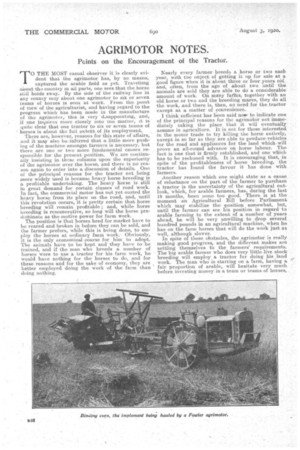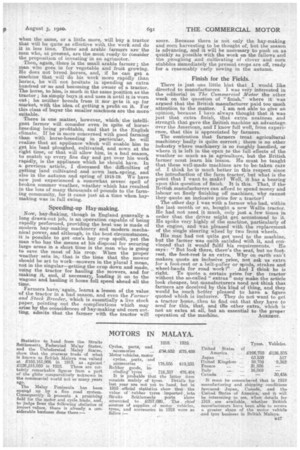AGRIMOTOR NOTES.
Page 24

Page 25

If you've noticed an error in this article please click here to report it so we can fix it.
Points on the Encouragement of the Tractor.
T0 THE MOST casual obseiwer it is clearly evident that the agrimotor has, by no means, captured the arable field as yet. Travelling about the country in all parts, one sees that the horse still holds sway. By the side of the railway line in any county only about one agrimotor to six or seven teams of horses is seen at work. lerom the point of view of the agriculturist, and having regard to the progress which has been made in the manufacture of the agrimotor, this is very disappointing, and, if one inquires more .closely into the Matter, it is quite clear that one tractor to six or seven teams of horses is about the full extent of its employment. There are, however, reasons far this state of affairs, and it may also be/inferred that a. little, more pushing of the machine amongst farmers is necessary, but there are one or two more fundamental causes responsible for the present position. We are continually insisting in these columns upon the sdperiarity of the agrimotor over the horse, and there is no reason again to enter into a discussion of details. One of the principal reasons for the tractor not being more widely used is because heavy horse breeding is a, profitable undertaking. The heayy horse is still in great demand for certain cla...sses of road work. In fact, the commercial motor has net yet ousted the heavy horse from its place on the road, and, until this revolution occurs, it is pretty certain that horse breeding will remain profitable ; and, while horse hreeding is remunerative, so long will the horse predorhinate as the motive power for farm work. The position is that horses bred for market have to be reared and broken in before they can be sold, and the farmer prefers, while this is being done, to employ the horses at ordinary farm work. Obviously, it is the only economical course for him to adopt. The animals have to be kept and they have to be trained, and if the man who breeds a number of horses were to use a tractor for his farm work, he would have nothing for the horses to do, and for these reasons and for the sake of economy, they are better employed doing the work of the farm than ' doing nothing. Nearly every farmer breeds a horse or two each year, With the object of getting it up for sale at a good figure when it is about three or four years old and, otten, from the age of about two until the animals are 'sold they are able to do a considerable amount of work. On many farms, together with an old horse or two and the breeding mares, they do all the work, and there is, then, no need for the tractor except as a matter of convenience.
I think sufficient has been said now to indicate one of the principal reasons for the agrimotor not immediately taking the place that it will eventually assume in agriculture. It is not for those interested in the motor trade to try killing the horse entirely, except in so far as they are able to produce vehicles for the road and appliances for the land which will prove an all-round advance on horse labour. The fact is one that is firmly established, and one which has to be reckoned with. It is encouraging that, in spite of the profitableness of horse breeding, the tractor has found the favour it. has done with farmers.
Another reason which one might state as a cause of reluctance on the part of the farmer to purchase a tractor is the uncertainty of the agricultural outlook, which, for arable farmers, has, during the last 18 months, been none too good. There is at 'the moment an Agricultural Bill before Parliament which may stabilize the position somewhat, but, until the farmer can see his position in regard to arable farming to the extent of a, number of years ahead, he will be very unwilling to drop. several hundred pounds in an agricultural machine,, when he has on the farm horses that will do the work just as well, although slower.
In spite of these obstacles, the agrimotor is really' making goad progress, and the different makes are settling themselves to the farmers' requirements. The big arable farmer who does very little live stock breeding will employ a tractor for doing his land work. The man who is starting on a farm, having a fair proportion of arable,. will hesitate very much before investing money in a team or teams of horses, .
when the same, or a little more, will buy a tractor that will be quite as effective with the work and do it in less time. These and arable farmers are the men who, at present, are the most ready to Consider the proposition of investing in an agrimoter. Then, again, there is the small arable farmer ; the man who goes in for vegetable and fruit growing. He does not breed horses, and, if he can get a machine that will do his work more rapidly than horses, he will not hesitate in spending an extra hundred or so and becoming the owner of a tractor. The horse, to him, is much in the same position as the tractor he simply buys it and uses it until it is worn out; lie'. neither breeds from it nor gets it up for merket, with the idea. of getting a profit on it. For this class of buyer the smaller machines are the more suitable.
There is one matter, however, which the intelligent farmer will consider even in spite of horsebreeding being profitable, and that is the English climate. If he is more concerned with good farming than with horse-breeding in particular, he will realize that an appliance which will enable him to get his land ploughed, cultivated, and, sown at the right time, or that will allow him, ia a had season, to snatch up every fine day and get over his work rapidly, is the appliance which he should have. In a previous article, I discussed the difficulties of getting land cultivated and sown last– spring, and also in the autumn and spring of 1918-19. We have now just experienced a somewhat severe spell of broken summer weather, weather which has resulted in the loss of many theusands ofpounds to the farming community, for it came just at a time when haymaking was in full swing.
Speeding-up Hay-making.
Now, hayetaking, though in England generally a long drawn-out job, is an operation capable of being rapidly performed, providing the best use is made of modern hay-making machinery and. modern mechanical power, and although, in the best circumstances, it is possible to get one's hay crop spoilt, yet the man who has the means at his disposal for securing large areas in a short time is the man who is going to save the most of his crop. When the proper weather sets in, that is the time that the mower should be set to work—mowers in the plural I mean, not in the singular—getting the crop down and made, using the tractor for hauling the mowers, and for making it, and, if necessary, loading it on to the wagons and hauling it home full speed. ahead all the time.
Farmers have, again, learnt a lesson of the value of the tractor in a bad season, and even the Farmer and Stock Breeder' which is essentially a live stock paper, pointing out the complications which may arise by the coincidences of ‘hay-making and corn cutting, admits that the farmer with the, tractor will
score. Because there is mit only the hay-making and corn harvesting to be thought of, but the season is advancing, and it will be necessary to push on as quickly as possible with the work on the fellows and the ptoughing and cultivating of clover and corn stubbles immediately the present crops are off, ready for a reasonably early sowing in the autumn.
Finish for the Fields.
There is just one little hint that I would like directed to manufacturers. I was very interested in the editorial in The Commercial Motor the other week on the question of " finish," where it was argued that the British manufacturer paid too much attention to the matter. I am not able to give an opinion, because I have always thought that it was just that extra finish, that extra neatnesse and strength that gave the British machine an advantage over the American, and I know full well, from experience, that this isappreciated by farmers.
The contention that farmers treat agricultural machinery badly is %lite correct; there is no other industry where machinery is so roughly handled, or where it is left in the open to the full effects of the weather so much as in agriculture, but the British farmer must learn his lesson. He must be taught that these well-made machines are to be-taken care of. I think he is much better in this respect since the introduction of the farm tractor; but what is the point that I want to make'? Well, it has a bearing upon this question of finish. It is this. That, if the British manufacturers can afford to spend money and labour on finely finishing off machines, why cannot theyquote an inclusive price for a tractor I • The other day I was with a farmer who had, within the last month or so, 'bought a. new Wallis tractor. He had not used it much, only just a few times in order that the driver might get accustomed to it. He spoke very highly of the machine, particularly of the engine, and was pleased with the replacement of the single steering wheel by two front wheels.
His man had not quite got used to the machine, but the farmer was tpaith satisfied with it, and convinced that it would fulfil his requirements. He says : " But look there, there's the seat, but no foot rest, the foot-rest is an extra. Why on earth can't makers quote an inclasive price, not ask us extra for a foot-rest or a belt-pulley or spuds, strokes and
I wheel-hands for road work And I think he is
right. To quote a certain price for the tractor without the so-called "extras may make the article look cheaper, but manufacturers need not think that farmers are deceived by this kind of thing, and they would be much better pleased to have a figure quoted which is inclusive. They do not want to get a tractor home, :then to find, out that they have to send for this, that, and the other extra, which is not an extra at all, but an essential to the proper
operation of the machine. A GRIMM.






























